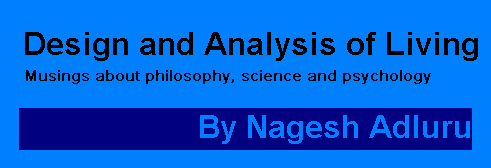A while ago I had a post reminding that heart-breaks have more to do with brain than with heart. My blog has a theme of meta-analysis of living. I recently started working on brain image analysis thanks to the inter-disciplinary thrust in academia that permits researchers like me to survive. After baffling with the basic problems of data process pipelining for about 2 months the data has been slowly growing on me (as with pretty much anything in my life: besides my very basic curiosity instincts and love for brilliance, everything else has grown on me starting in about 1-2 months :)
Psychological analysis until the advent of brain image acquisition and computational learning has mostly been non-rigorous and often can lead to faulty conclusions. For example: "guys can do a lot for a girl merely by evolutionary instincts but in olden days when knowledge about biology and psychology was limited when we don't understand it fully we can conclude things like females are witches they can take control of men etc. etc. That's what made people in ancient days conclude such things. " Such psychological analyses also can lead to creating characters like confessor in Legend of the Seeker series. They are so attractive that the opposite person if confessed becomes an obedient slave!
The psychology people look at behavioral data and try to perform some statistical tests (typically t-test) to see if null-hypothesis can be rejected. The main problem with behavioral data is that usually conclusions would be "trivial" or very questionable if they are non-trivial! Ability to look inside the brain and work on that data can (to some extent) alleviate such problems because in some sense we are looking at the data more close to the "causal" processes of the behavior.
For the past two-months I have been looking at an dataset. At first I had hard time understanding autism but then I realized the effort to understand some out of the norm behaviors is rewarding in itself as it can help us build tolerance and de-couple the actual person (soul?) with his behavior. For the past few weeks I have been seeing lot of "brain related" news on the media: Natasha Richardson's death, Michael J. Fox's appearance on talk shows, Jim Carrey's support for autism etc. etc. I guess when you are working on something and you have access to the world you will filter the information through your own lens :)
Brain image analysis is a one of the very important inverse problems as it can not only have many many applications relevant for day to day life but also give insights into the origins of our life the answer to which can satisfy every single soul on this planet! I never saw a real brain so far (I might soon) but one of my colleagues here saw human, rat and dog brains and she tells me that rat and dog brains are much flatter than ours. It makes me wonder if our never ending self-referential questioning might have created those "folds"! Well we don't know if our questioning is from folds or we form folds because of our questioning instinct. But something interesting can be observed in children's behavior. In general a child is much more curious and can learn faster than the adult counterpart. I think this is because a child is inherently more vulnerable. than an adult and he craves for knowledge and information that can help him survive. Since our bodies are not "wild" compared to other animals we needed to fold up our brain a lot to be able to exist so long on this planet! And so far it seems to pay off to focus on brain. So roll up your sleeves and tone up those folds by working out on relevant hard problems! By analyzing brain data I hope I am doing it :)
Saturday, April 11, 2009
Subscribe to:
Comments (Atom)
